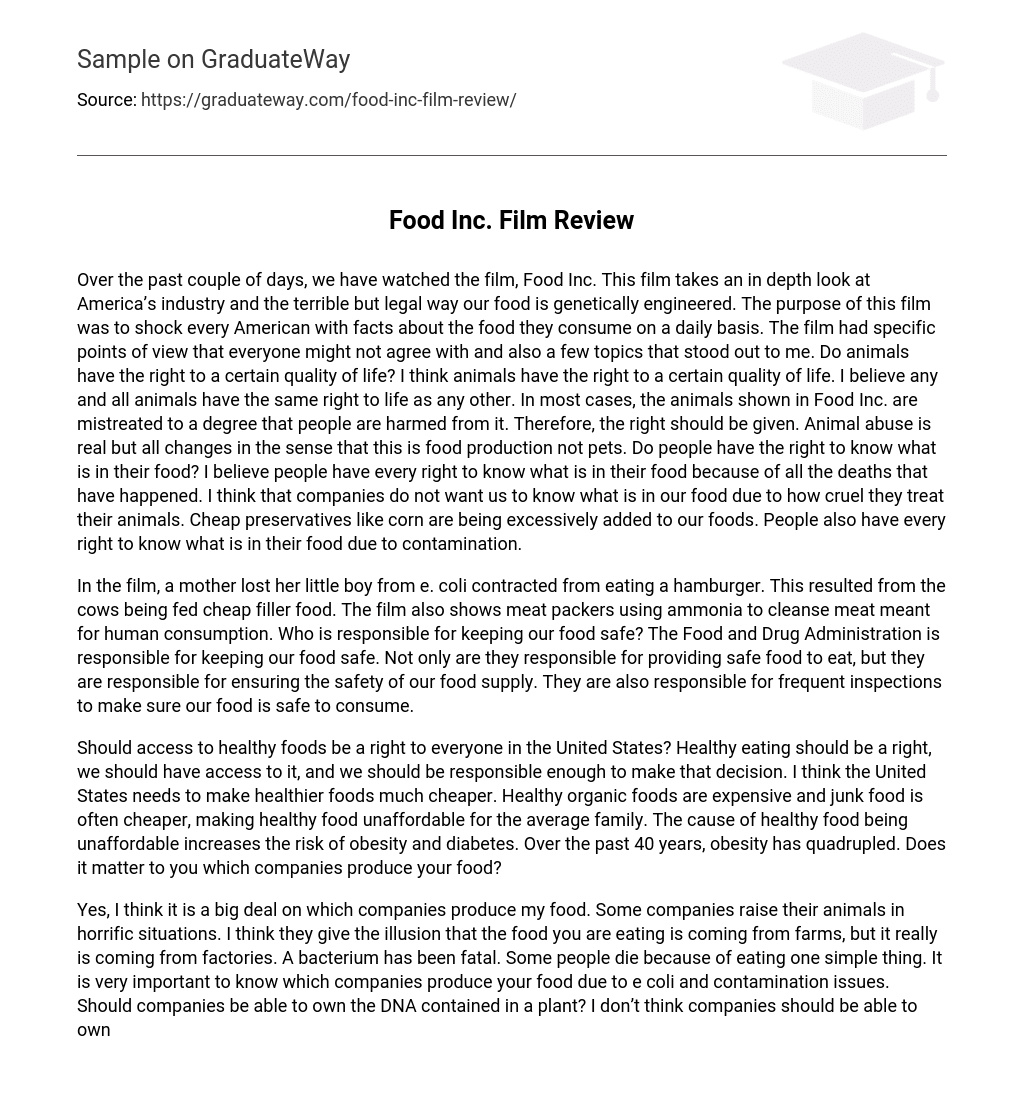In the past few days, we watched Food Inc., a film that thoroughly examines the American food industry and its legally questionable methods of genetically modifying food. The film’s purpose is to shock American viewers with factual information about their daily consumption habits. Although the film presents specific viewpoints that may not be universally agreed upon, it raises several noteworthy subjects.
One such topic is whether animals deserve a certain quality of life; personally, I firmly believe that all animals should have an equal right to life as any other species does. Food Inc. effectively shows how many animals depicted in the movie are mistreated to such an extent that humans also suffer negative consequences, which is why I advocate for recognizing this right. It is important to acknowledge that while animal cruelty is serious, its context within food production differs from pet ownership.
Another significant issue raised by the film questions whether individuals have the right to know what ingredients make up their food. I strongly believe that people should have complete knowledge about what they consume, especially considering numerous deaths resulting from this lack of transparency. It is clear that companies want to hide their inhumane treatment of animals and often use excessive amounts of cheap preservatives, such as corn, in our food. It is important for individuals to be aware of potential contamination in their meals and have the right to access this information.
The film portrays a scenario where a mother’s child goes missing after contracting e. coli from eating a hamburger. This infection is caused by the use of cheap food fillers for cows. Furthermore, the movie exposes the meat packing industry’s practice of using ammonia to sanitize meat meant for human consumption. The Food and Drug Administration (FDA) has the responsibility of ensuring both the safety of our food supply and overall food safety. They carry out periodic inspections to ensure that the food we eat is safe.
My belief is that everyone in the United States should have the right to access healthy foods. However, it is important to recognize that individuals also have a responsibility in making this choice. From my perspective, the United States needs to address the issue of expensive healthier food options such as organic foods, which are known for their health benefits and tend to be pricier compared to junk food. Consequently, many average families struggle to afford and prioritize healthy eating. This lack of accessibility contributes to an increased risk of obesity and diabetes. It is noteworthy that over the past four decades, there has been a significant fourfold increase in obesity rates. Therefore, it is crucial to consider how our overall health is impacted by the production of our food.
I strongly believe in the importance of knowing where my food comes from. It is concerning that some companies mistreat animals and deceive consumers by falsely presenting their products as coming from farms, when they are actually produced in factories. Even a small bacterium can be deadly, leading to fatalities from consuming even a simple food item. Therefore, it is crucial to have knowledge about our food producers in order to protect ourselves from potential dangers such as e coli and contamination. Furthermore, I am personally against granting corporations ownership of plant DNA as it could greatly impact traditional farming practices.
In my perspective, the permission for companies to own their DNA provides a chance for other companies to patent different crops. This could lead to significant financial damages as companies invest in this natural phenomenon. Moreover, it raises an ethical issue of whether a company should determine what information is shared with consumers regarding the food they produce. By hiding information, consumers may unknowingly consume questionable ingredients. Hence, I support legal requirements that compel companies to reveal all relevant particulars about the food they manufacture in order to prevent potential harm.
It is essential for companies to be open and honest about the ingredients in their food so that consumers can make informed choices. However, some companies choose not to disclose this information out of fear of losing customers.
What are your thoughts on the film Food Inc.? Do you have an opinion about it? Personally, after watching this film, I have become more aware of the food I buy and consume, as well as its impact on environmental sustainability and animal welfare. I now understand that what I eat every day has the potential to affect my future health.
Furthermore, I have also realized that the food I consume may contain harmful bacteria, which could result in illness or even death.
This film greatly influenced my perception of the healthiness of products advertised through different media outlets. It reminded me that I have the freedom to decide what I consume and changed how I view nutrition, making me more conscious of my daily dietary decisions. In general, I found the movie both entertaining and informative about food production practices, completely transforming how I see certain food items. The film’s conclusion emphasized the significance of being knowledgeable about where our food comes from and choosing organic and locally-sourced options whenever possible.





